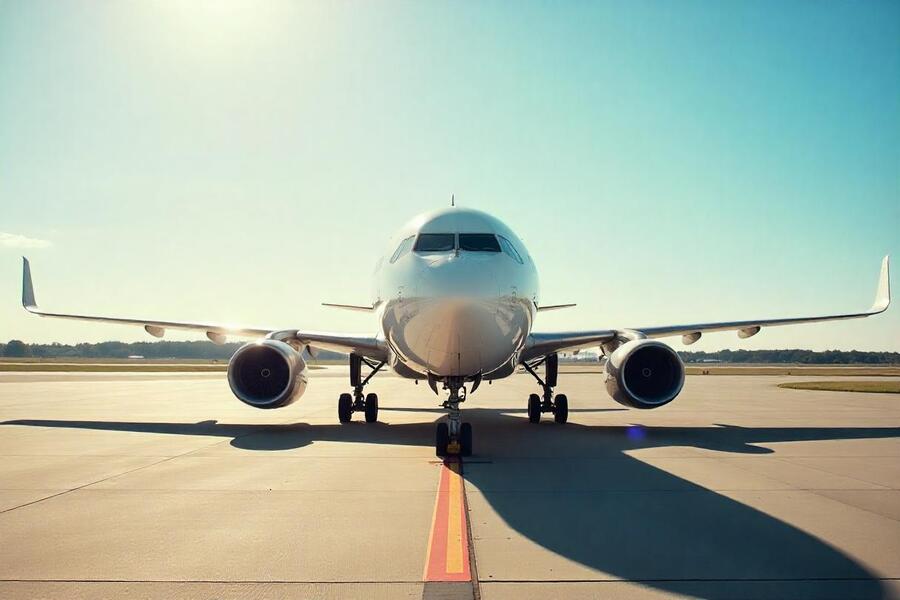Published on
October 12, 2025
Greece continues to assert its prominence in European aviation, ranking as the seventh-busiest airspace on the continent, with an impressive two thousand and eighty-nine flights daily, according to the latest Eurocontrol statistics. This strong performance highlights Greece’s enduring appeal as a key hub for both leisure and business travel, despite the seasonal fluctuations that typically affect air traffic. The country’s strategic location, along with its popular tourist destinations, contributes to its consistent position as a vital player in Europe’s airspace, attracting a high volume of flights year-round.
During the week of September 29 to October 5, Greece ranked as the seventh busiest airspace in Europe, handling an average of 2,089 flights per day, according to the latest data released by Eurocontrol. This report highlights the ongoing importance of Greece as a key hub for air traffic in Europe, especially during peak travel periods, including the transition from the summer to the autumn season. Despite some recent fluctuations in traffic, Greece’s airspace continues to show resilience and a notable level of activity in comparison to the broader European context.
Although the number of flights in Greek airspace experienced an 8% drop from the previous week, this decline is not entirely unexpected. Seasonal shifts, including the changeover from summer to fall flight schedules, tend to influence air traffic patterns across Europe. During the summer months, many airlines increase capacity to accommodate the surge in tourism, especially to popular destinations such as Greek islands and beach resorts. However, as the peak tourist season ends and the autumn months set in, airlines typically reduce the number of flights in response to lower demand. This shift in flight operations is a key factor behind the recent dip in air traffic recorded for Greece.
Despite this decline, Greece’s airspace remains in a strong position compared to previous years. The weekly flight numbers during this period were 7% higher than the same week in 2024, which reflects ongoing growth in air travel to the country. Additionally, Greece’s air traffic was 26% above the levels seen in 2019, a clear indicator of the country’s recovery and growth in the post-pandemic period. These figures suggest that Greece continues to be a significant player in European aviation, attracting both leisure and business travelers alike.
The seasonal decline in air traffic also coincides with the natural ebb in tourism, particularly for destinations that rely heavily on summer visitors. Greek islands, which are major attractions for international tourists, see a reduction in arrivals as the weather cools and the holiday season comes to an end. This seasonal shift affects airlines with a strong presence on routes to these popular destinations, as fewer travelers opt to visit in the shoulder seasons. For example, airlines operating flights to islands such as Santorini, Mykonos, and Crete typically reduce their schedules once the peak tourist period ends.
However, the overall demand for flights to Greece remains robust. The country’s appeal as a vacation destination, with its rich cultural heritage, historical landmarks, and picturesque landscapes, continues to draw a steady stream of visitors year-round. While the summer months may be the most lucrative for Greece’s tourism industry, the off-season still sees considerable traffic, particularly from travelers seeking milder weather and fewer crowds. In this regard, Greece’s strong showing in comparison to pre-pandemic levels is a testament to the country’s enduring appeal as a destination for international travelers.
One noteworthy aspect of Greece’s air traffic performance during this period is its contribution to Europe’s overall flight delays. Greece accounted for 11% of all flight delays across the continent during the week of September 29 to October 5. This figure is significant, as it reflects the complexities of managing air traffic in one of Europe’s busiest airspaces. Delays can be caused by various factors, including adverse weather conditions, airspace congestion, and operational disruptions. However, given Greece’s central role in European aviation, it is not unusual for the country to experience a higher share of delays, especially during peak travel times.
The delays experienced within Greece’s airspace are likely to be a result of the challenges that come with managing high volumes of air traffic. Major airports like Athens Eleftherios Venizelos, Thessaloniki, and Heraklion serve as important gateways for international travelers, and managing the flow of flights at these hubs can be a complex task. Additionally, Greece’s location as a transit point for flights between Europe, the Middle East, and Asia means that its airspace handles a significant amount of overflying traffic. As a result, delays in Greek airspace can have ripple effects across neighboring countries and regions.
Despite the challenges posed by occasional delays, Greece remains an attractive and dynamic destination for air travel. Its strategic location, coupled with its cultural and historical significance, ensures that it continues to draw large numbers of visitors from around the world. Moreover, the increase in traffic compared to 2024 and 2019 levels demonstrates that Greece’s aviation sector is poised for continued growth, even in the face of seasonal fluctuations.
Greece continues to dominate Europe’s air traffic, ranking seventh with two thousand and eighty-nine flights daily, thanks to its strategic location and strong appeal as a top travel destination.
the week of September 29 to October 5 saw Greece maintaining its position as one of Europe’s busiest and most important airspaces. While air traffic did decline by 8% compared to the previous week, the overall picture remains positive, with a 7% increase over the previous year and a 26% rise compared to 2019. The seasonal transition from summer to fall, along with a natural decrease in tourism, contributed to this temporary decline. However, Greece’s strong performance in comparison to past years reflects the country’s ongoing appeal as a major destination for international travelers. The high percentage of flight delays in Greek airspace further underscores the complexity of managing air traffic in such a significant hub, but it does not detract from the country’s continued importance in the European aviation landscape.
